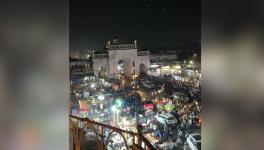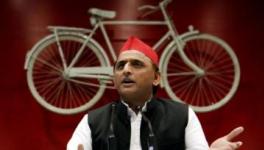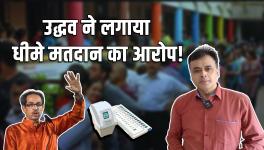Travelled for ‘Delhi Chalo’: UP Farmers’ Ordeal Provides Peek into Police Surveillance
Farmers from Uttar Pradesh stay put at Delhi-Noida link road passing through Chilla Border. Image clicked by Ronak Chhabra
New Delhi: As one enters Delhi, leaving behind the “main entry gate” of Uttar Pradesh’s Gautam Budh Nagar, a blue hoarding at the Delhi-Noida link road greets visitors. “Delhi aagman par aapka haardik swaagat hai (Welcome to Delhi),” the message on the board reads.
However, the hospitality was not extended to the marching farmers from Uttar Pradesh, for whom Friday marked the third day that they stayed put at this interstate border point – known as the Chilla border – after being denied entry.
Farmers led by multiple unions who have managed to reach here also recount how even travelling to Delhi from their native districts was nothing short of a “nightmare” for them, with those willing to join the protests against the controversial Farm Laws “harassed” by the state police administration over the past few days.
Some would need to “disguise themselves” or “take longer routes” to evade the state police checks on the highways. The farmers lamented that those who were caught by the police are being made to submit their contact details alongside a ‘signed note’. The note would usually carry an ‘assurance’ to the UP police – which reports to theYogi Adityanath-led Bharatiya Janata Party (BJP) government in the state – that the undersigned would not be joining the protests at the Delhi border.
The farmers’ ordeals provide a peek into the heavy police surveillance in another BJP-ruled state in the backdrop of the farmers’ agitation.
“I started from my village with two of my comrades on Tuesday to join the protests in Delhi,” said Anoop Singh from Bulandshahr, adding that a Bharatiya Kisan Union (Bhanu) flag was fluttering on the windows of their car alongside union stickers pasted on the front and the back. The call to block the entry-exit points to the city through Noida at the Chilla border was given for Wednesday after an earlier blockade on the same spot was lifted.
However, Singh, who was travelling to take part in this protest, was not aware. “We were stopped at the Badi Chowk in Greater Noida at one in the afternoon,” the 70-year old told NewsClick on Thursday. The police wouldn’t allow them to pass through for they feared that they would join the farmers’ protests, he added.
Eventually, after being not allowed to move for six hours, they assured the police that they would return. “We then decided to take a longer route. We somehow managed to arrive here by midnight – we were lucky enough on the other route to not be stopped (by the police) again. But it was all one nightmare.” he added.
Such a stroke of luck, however, didn’t come to the rescue of another farmer at the Chilla border, who alleged that he was “constantly receiving calls from police officials in my district.”
“They are asking me how my car is parked at the protest site,” he told NewsClick on the condition of anonymity. How did the officials come to know? “It is because while we were on our way, our car was stopped near Aligarh at a checkpost. The police would only allow me to move after collecting our details and after we gave them in writing that we wouldn’t be joining the protests,” he alleged. Unlike in Singh’s case, the car in which this farmer, along with three others, were travelling, bore no evidence of their association with any farmers’ union.
“But I didn’t know they would get to know of us being here eventually,” he said, worried, suggesting that information of the cars present at the protest sites were shared with district police stations. “It’s like they are harassing us for voicing our anger. I am worried about my family,” he said.
At least three other farmers who stood nearby confirmed the same to NewsClick. However, none of them was comfortable in sharing any names or details on the record. “Many of us had to disguise ourselves in some or the other way just to reach here. Otherwise we were sure we wouldn’t have been allowed to,” said one from among them.
Notably, notices to submit personal bonds have been submitted to farmer leaders recently by at least one district administration in Uttar Pradesh, reportedly to prevent them from “inciting” farmers to join the protest.
Yogesh Pratap Singh, state president of BKU’s (Bhanu) UP unit, told NewsClick that many of the leaders associated with farmers’ unions in the state have been put under “house arrest” or are being “denied free movement outside their districts. The UP administration is trying everything to restrict the participation of farmers from the state in the ongoing protests,” he alleged.
NewsClick had recently reported on how farmers from Gujarat – another state ruled by the BJP – faced difficulties in leaving the state to join the protest at Rajasthan-Haryana border, even more so in large groups, as the Gujarat administration implemented Section 144 of the CrPC, which prohibits assembly of four or more people in an area, across the state.
Ashok Dhawale, president, All India Kisan Sabha, said that the “agenda” of the BJP was “clear”. He said that they prevented the ongoing farmers’ movement from being projected as a pan-India protest. “But this is where they are failing. Because, despite all their measures, farmers continue to travel to the national capital to join the protests – even from Uttar Pradesh and Gujarat and other states,” Dhawale told NewsClick.
‘Farmers Will Receive Less, General Public Will Pay More’
Meanwhile, the Delhi-Noida link road remains fortified with yellow barricades, protected by companies of Central Industrial Security Force (CISF) and Central Armed Police Forces (CRPF), accompanying Delhi police personnel.
Companies of CISF and CRPF accompany Delhi police personnels at the Chilla border. Image clicked by Ronak Chhabra
The major apprehensions of the agitating farmers here is the doing away with of the powers of the government through the much touted “agriculture reforms” to impose limits on stocks of goods considered essential. The Essential Commodities (Amendment) Bill, 2020 seeks to deregulate food items, including cereals and pulses. Mainly hailing from districts like Agra, Mathura, Firozabad, and Etah, the farmers present at Chilla border are sow potato, wheat, rice, maize and mustard.
Giving private traders a free hand to hoard is being feared as a move to further drive down crop prices, especially at a time when the producers will arrive at the mandis to sell – a fear that is not completely unfounded.
Last season, Narendra Pal Singh from Firozabad sowed potatoes in 200 bighas of tilled land, and had a portion also dedicated to wheat and mustard. “Firstly, I had to sell the potatoes to a private trader at a rate that was far below the average market price. Then, I also paid 2.5% commission – along with storage charges – to the owner of a private cold storage where my produce was stored before it was sold,” the 65-year old rued, adding that the storage owners would “press” to clear the stocks before October each year to clear the godown for the next stock. This pressure would often result in the individual tiller accepting whatever price they were offered.
“We have been demanding the government to form cooperative societies of farmers – one each for three to four nearby villages – and construct a storage facility for our crop produce which could then be run by the society itself,” said 40-year-old Umesh Kumar Verma, who owns about 18 bighas in Lucknow district.
Verma feared that a change in the commodities act will translate into “licensing” the black marketeers to hoard essentials. “The farmer will receive lesser for their work but the general public will pay a lot more. Only the middlemen will benefit,” he told NewsClick, adding that the corporate houses “would sooner or later cash upon the opportunity to make huge profits.”
Twenty-eight-year-old Dharamveer Singh Yadav from Kasganj district stood near Verma. He aptly summed up the farmers’ woes: “Pehle demonetisation, ab yeh. Jab anaj ka daam hi giraate rahegi sarkaar toh phir toh ho gayi kisano ki aay double. (First demonetisation and now the Farm Laws. If this is how the price of crop is set to decrease then one can imagine how farmers’ income will be doubled.)”
Get the latest reports & analysis with people's perspective on Protests, movements & deep analytical videos, discussions of the current affairs in your Telegram app. Subscribe to NewsClick's Telegram channel & get Real-Time updates on stories, as they get published on our website.
























